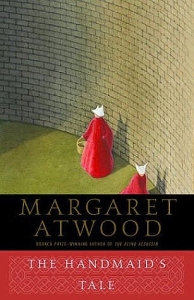 by Margaret Atwood, 1986
by Margaret Atwood, 1986
I read The Handmaid’s Tale years ago and, while I loved it, I didn’t remember many specific details of this classic feminist dystopia. I’ll just give it a little re-read before the Hulu series comes out, I thought. Little did I know that I’d find myself reading this, fists literally clenched, terrified that I was staring into my future.
The Handmaid’s Tale is the story of Offred. Living in the Republic of Gilead after war and environmental destruction have rendered many citizens sterile, Offred belongs to the small, prized group of women who can still reproduce – she is a handmaid. Wearing a long red dress to signify her fertility and a white hat with blinders to encourage demureness, she has been assigned to the Republic’s Commander and it is her job to create a child with him.
I don’t want to reveal too much of the plot, as it is really does become more horrifying as it unfolds, a sort of avalanche of misogynist oppression. I will say that Atwood is eerily prescient in her descriptions of this dystopian society and the lengths it goes to in the name of “protecting” its women. For that is what they claim to do: protect women. In this society in which women are not to speak to each other, are not to read nor write, are assigned to a man instead of choosing one for themselves, this is deemed freedom. They are told to remember that they’ve been given more than they’ve had taken away, that their problems of humiliating blind dates and desperation for a relationship have been solved. They are there to fulfill the womanliest of duties and are “revered” for their purpose. Never mind that, should they fail to conceive, the fault is theirs alone. Only women can be infertile, you see. Male virility remains, however theoretically, intact.
If these practices seem preposterous, if you think they are outside the realm of possibility, I urge you to think again:
It was after the catastrophe, when they shot the president and machine-gunned Congress and the army declared a state of emergency. They blamed it on the Islamic fanatics, at the time. Keep calm, they said on television. Everything is under control… That was when they suspended the Constitution. They said it would be temporary. There wasn’t even any rioting in the streets. People stayed home at night, watching television, looking for some direction. There wasn’t even an enemy you could put your finger on.
Firmly rooted racist policies and fears were a direct cause of this society’s collapse. There was an otherness that allowed citizens to turn a blind eye to the discrimination, feeling only grateful that these things were not happening to them. “This may not seem ordinary to you now, but after a time it will. It will become ordinary,” says one of the Aunts who trains the handmaids. And that is the moral, that is what we must fight, the ordinariness of the violation of rights, of violence, of abuse. The more we are grateful that it is others who are being forced to register for their religion, others who risk being shot by police at a routine traffic stop, others who are not allowed to make choices for their own bodies, the more this will be ordinary and more we will be complicit with the agenda of hate. The Handmaid’s Tale was speculative fiction back in 1986. It must not become truth today.
I must mention one final quote that struck me as so important. Skirting decorum, the Commander invites Offred to his office for a clandestine visit. Her awe upon seeing the room is notable:
All around the wall there are bookcases. They’re filled with books. Books and books and books, right out in plain view, no locks, no boxes. No wonder we can’t come in here. It’s an oasis of the forbidden.
In this time of subjugation, books are the wanton fruit. Knowledge is power. Fear of that power has never been stronger than it is today.
I love Atwood she is an amazing writer and eerily good at predicting the direction of the world
LikeLiked by 1 person
Agreed 100%.
LikeLike
I haven’t read the book yet but will definitely do so before the show comes out. It sounds fascinating!
LikeLiked by 1 person
Definitely do! I’d call it a must-read for everyone.
LikeLiked by 1 person
Pingback: 182 The Power | The Thousand Book Project
Pingback: The Bible: Genesis | The Thousand Book Project
Pingback: 237 Red Clocks | The Thousand Book Project
Pingback: 271 The Bees | The Thousand Book Project
Pingback: 289 The Testaments | The Thousand Book Project